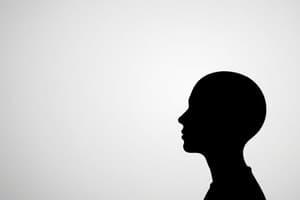Podcast
Questions and Answers
The superego is primarily responsible for a person's safety requirements and moral dictates.
The superego is primarily responsible for a person's safety requirements and moral dictates.
True (A)
Psychodynamic theories emphasize the role of learned behaviors in influencing mental states.
Psychodynamic theories emphasize the role of learned behaviors in influencing mental states.
False (B)
Humanistic theories believe that individuals have an innate tendency toward personal growth and self-actualization.
Humanistic theories believe that individuals have an innate tendency toward personal growth and self-actualization.
True (A)
According to Family Systems theories, psychological disorders are seen as problems within the individual.
According to Family Systems theories, psychological disorders are seen as problems within the individual.
The ego is responsible for making decisions regarding the pleasures to pursue at the id's demand.
The ego is responsible for making decisions regarding the pleasures to pursue at the id's demand.
Cognitive distortions are primarily addressed by psychodynamic therapies.
Cognitive distortions are primarily addressed by psychodynamic therapies.
Under pressure from society, individuals are more likely to experience alignment between their true self and ideal self.
Under pressure from society, individuals are more likely to experience alignment between their true self and ideal self.
Emotion-focused theories emphasize the understanding and regulation of emotions as key components of mental health.
Emotion-focused theories emphasize the understanding and regulation of emotions as key components of mental health.
Classical conditioning can explain seemingly irrational responses to neutral stimuli.
Classical conditioning can explain seemingly irrational responses to neutral stimuli.
Operant conditioning involves punishing all behaviors to shape learning.
Operant conditioning involves punishing all behaviors to shape learning.
Modeling is learning through observing the behaviors of others.
Modeling is learning through observing the behaviors of others.
Cognitive theories suggest that rewards and punishments primarily shape our behaviors and emotions.
Cognitive theories suggest that rewards and punishments primarily shape our behaviors and emotions.
Psychodynamic theories emphasize that behaviors are largely influenced by unconscious processes.
Psychodynamic theories emphasize that behaviors are largely influenced by unconscious processes.
According to Freud, the ego constantly balances the desires of the id and the demands of the super-ego.
According to Freud, the ego constantly balances the desires of the id and the demands of the super-ego.
Cognitive distortions are positive beliefs that enhance self-esteem.
Cognitive distortions are positive beliefs that enhance self-esteem.
The concept of 'psychic energy' in psychodynamics relates only to conscious thoughts.
The concept of 'psychic energy' in psychodynamics relates only to conscious thoughts.
Genetics play a role in mental health by influencing a person's diathesis for certain disorders.
Genetics play a role in mental health by influencing a person's diathesis for certain disorders.
Behavioral conditioning does not affect the development of fears and phobias.
Behavioral conditioning does not affect the development of fears and phobias.
Cognitive distortions have no impact on an individual's perception of stressful events.
Cognitive distortions have no impact on an individual's perception of stressful events.
The biopsychosocial approach integrates biological, psychological, and social factors in understanding mental disorders.
The biopsychosocial approach integrates biological, psychological, and social factors in understanding mental disorders.
The nature-nurture question revolves around the influence of genetics versus environmental factors on behavior.
The nature-nurture question revolves around the influence of genetics versus environmental factors on behavior.
Psychodynamic theories emphasize the importance of unconscious processes in shaping behavior and mental health.
Psychodynamic theories emphasize the importance of unconscious processes in shaping behavior and mental health.
Age does not influence how individuals adapt to traumatic experiences, such as parental separation.
Age does not influence how individuals adapt to traumatic experiences, such as parental separation.
A person must experience both a diathesis and a stressor to develop a mental disorder.
A person must experience both a diathesis and a stressor to develop a mental disorder.
Flashcards are hidden until you start studying
Study Notes
Ego
- Manages personality by making decisions about:
- Id's desires
- Safety needs
- Superego's moral dictates
Superego
- Holds moral values
- **Conscience:** internalized societal rules
- **Ego Ideal:** internalized personal goals
Psychodynamic Theory
- Focuses on interactions of id, ego and superego
- Explains behavior through innate emotional forces and processes
Humanistic Theory
- Normal and abnormal behavior arise from societal pressures to conform
- Fulfillment of innate capacity for goodness and a full life is key
- Environment influences happiness or unhappiness
- Without pressure, individuals pursue growth, self-acceptance and self-actualization.
- Conflict arises from pressure and the differences between the true self and ideal self
- Conflict leads to emotional distress and unhealthy behavior
Family Systems Theory
- Views psychological disorders as a result of a dysfunctional family system
- Individual psychopathology is the result of complex interactions between family cohesiveness, adaptation to change and communication style
Emotion-Focused Theories
- Focus on understanding and regulating emotions
Behaviorism Theories
- Focus on learning processes:
- Classical conditioning: explains irrational responses to stimuli
- Operant conditioning: Shapes behavior through rewards and punishments
- Modeling : Learning through imitation of important people
- Observational learning: learning from the consequences of others' behaviors
Cognitive Theories
- Thoughts and beliefs shape behaviors and emotions, not rewards and punishments
- Maladaptive behaviors and negative emotions result from global assumptions such as:
- Needing to be loved by everyone
- Avoiding problems instead of facing them
- Striving for perfect competence and intelligence
Psychodynamic Theories
- Unconscious processes influence behavior, thoughts, and emotions
- Freud's focus on libidinal and aggressive drives as motivators
- Transformation and exchange of "psychic energy" within personality
- Ego's battle with:
- Id (unconscious reservoir of libido)
- Superego
- Outside World
Etiological Theories of Abnormality
- Integrated biopsychosocial approach: combination of biological, psychological, and social factors
- Nature-nurture: is the disorder biological (nature) or caused by social experiences (nurture)?
- Diatheses-stress model: a predisposition to a disorder may be triggered by stress
Studying That Suits You
Use AI to generate personalized quizzes and flashcards to suit your learning preferences.




